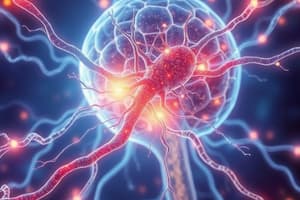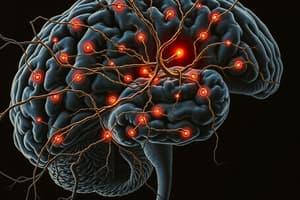Podcast
Questions and Answers
What percentage of our lives do we spend sleeping on average?
What percentage of our lives do we spend sleeping on average?
- 36% (correct)
- 25%
- 70%
- 50%
Sleep deprivation can lead to a reduced concentration and problem-solving abilities.
Sleep deprivation can lead to a reduced concentration and problem-solving abilities.
True (A)
Name one consequence of sleep deprivation.
Name one consequence of sleep deprivation.
reduced concentration
A lack of sleep can make us more susceptible to ________.
A lack of sleep can make us more susceptible to ________.
Match the following consequences of sleep deprivation with their effects:
Match the following consequences of sleep deprivation with their effects:
What structure links the nervous system to the endocrine system?
What structure links the nervous system to the endocrine system?
White matter in the brain is composed primarily of cell bodies.
White matter in the brain is composed primarily of cell bodies.
What is the role of the hippocampus in memory?
What is the role of the hippocampus in memory?
The ______ organizes emotional responses such as fear and anxiety.
The ______ organizes emotional responses such as fear and anxiety.
Match the brain structure to its function:
Match the brain structure to its function:
Which type of brain matter contains cell bodies and dendrites?
Which type of brain matter contains cell bodies and dendrites?
The amygdala is involved in organizing emotional responses such as aggression.
The amygdala is involved in organizing emotional responses such as aggression.
What crucial role does the hypothalamus play in the body?
What crucial role does the hypothalamus play in the body?
Areas of the brain made out of myelinated axons are called ______.
Areas of the brain made out of myelinated axons are called ______.
Which type of memory is particularly affected by Alzheimer's disease?
Which type of memory is particularly affected by Alzheimer's disease?
What happens to neural functioning when artificial opiates are consumed?
What happens to neural functioning when artificial opiates are consumed?
Higher doses of opiates are needed to achieve the same effect due to developing tolerance.
Higher doses of opiates are needed to achieve the same effect due to developing tolerance.
What substance can heroin be substituted with to curb withdrawal symptoms?
What substance can heroin be substituted with to curb withdrawal symptoms?
Repeated exposure to artificial opiates can lead our brains to stop producing its own form of __________.
Repeated exposure to artificial opiates can lead our brains to stop producing its own form of __________.
What is a common result of long-term opiate use?
What is a common result of long-term opiate use?
Breathing slows and pupils dilate as a result of opiate consumption.
Breathing slows and pupils dilate as a result of opiate consumption.
What feeling often replaces pain or anxiety when using opiates?
What feeling often replaces pain or anxiety when using opiates?
Lower doses are needed to achieve the same effect as __________ develops.
Lower doses are needed to achieve the same effect as __________ develops.
What is a significant consequence of overdose on opiates?
What is a significant consequence of overdose on opiates?
Match the term with its correct description:
Match the term with its correct description:
What is the primary function of sensory neurons?
What is the primary function of sensory neurons?
The autonomic nervous system controls voluntary muscle movements.
The autonomic nervous system controls voluntary muscle movements.
What type of neurons carry instructions from the CNS to the body's muscles?
What type of neurons carry instructions from the CNS to the body's muscles?
The __________ nervous system enables voluntary control of skeletal muscles.
The __________ nervous system enables voluntary control of skeletal muscles.
Match the following parts of the nervous system to their functions:
Match the following parts of the nervous system to their functions:
Which neurons are involved in processing information between sensory input and motor output?
Which neurons are involved in processing information between sensory input and motor output?
The peripheral nervous system includes both the somatic and autonomic nervous systems.
The peripheral nervous system includes both the somatic and autonomic nervous systems.
Name one function that the autonomic nervous system controls:
Name one function that the autonomic nervous system controls:
The __________ carries signals from tissues to the central nervous system.
The __________ carries signals from tissues to the central nervous system.
Match the following terms with their descriptions:
Match the following terms with their descriptions:
What do motor neurons primarily control?
What do motor neurons primarily control?
Interneurons are primarily responsible for carrying messages to and from sensory organs.
Interneurons are primarily responsible for carrying messages to and from sensory organs.
What is the role of the autonomic nervous system in the body?
What is the role of the autonomic nervous system in the body?
The __________ nervous system is responsible for involuntary self-regulating actions.
The __________ nervous system is responsible for involuntary self-regulating actions.
What are opiates commonly prescribed for?
What are opiates commonly prescribed for?
Stimulants decrease neural activity and slow down bodily functions.
Stimulants decrease neural activity and slow down bodily functions.
Name one common side effect people may experience when they do not get their usual dose of stimulants.
Name one common side effect people may experience when they do not get their usual dose of stimulants.
Narcotics such as _____ or _____ are often prescribed for mild to moderate pain.
Narcotics such as _____ or _____ are often prescribed for mild to moderate pain.
What effect do stimulants have on heart rate?
What effect do stimulants have on heart rate?
It is not important to have easy access to a doctor when taking prescription medicine.
It is not important to have easy access to a doctor when taking prescription medicine.
Match the following effects with the type of drug:
Match the following effects with the type of drug:
Stimulants can lead to _____, causing sleep deprivation.
Stimulants can lead to _____, causing sleep deprivation.
Flashcards are hidden until you start studying
Study Notes
The Nervous System
- The nervous system is responsible for communication between our environment and our senses.
- Information travels through the nervous system (NS) via different types of neurons:
- Sensory neurons: Carry messages from skin and sensory organs to the brain and spinal cord.
- Motor neurons: Carry instructions from the central nervous system (CNS) to muscles and glands.
- Interneurons: Process information between sensory input and motor output.
The Peripheral Nervous System
- Somatic nervous system: Enables our voluntary control of skeletal muscles.
- Autonomic nervous system: Controls glands and internal muscles, self-regulating important functions like heart beat, blood pressure, and breathing.
Grey and White Matter
- Grey matter: Contains cell bodies, dendrites, glial cells, etc.
- White matter: Made up of myelinated axons.
The Limbic System
- Hippocampus: Involved in consolidating memories from short-term to long-term. Plays a role in spatial memories, navigation, and cognitive maps. Affected by Alzheimer's.
- Amygdalae: Organize emotional responses, including fear, anxiety, and aggression.
Sleep Basics
- Sleep is essential for health and well-being.
- We spend approximately 36% of our lives sleeping.
Functions of Sleep
- Restoration of energy: replenishes energy stores
- Conservation of energy
- Brain function: helps with consolidation of memories, emotional regulation, and cognitive function
Consequences of Sleep Deprivation
- Reduced concentration, memory, and problem-solving abilities.
- Increased risk of weight gain and type 2 diabetes.
- Suppressed immune system, leading to increased susceptibility to infections.
- Higher risk of cardiovascular diseases and mental illnesses.
- Depresses neural functioning.
Opiates
- Effects: Slows breathing, constricts pupils, induces feelings of lethargy and euphoria replacing pain or anxiety.
- Tolerance: With repeated exposure, higher doses are needed to achieve the same effect.
- Withdrawal symptoms: Include anxiety, agitation, and more severe symptoms as tolerance develops.
- Overdose: Can lead to an inability to naturally cope with pain due to the brain stopping its own production of endorphins.
- Methadone: Can be used to curb withdrawal symptoms.
- Prescription: Opiates are often prescribed by doctors as pain relievers or cough suppressants.
- Narcotics: Morphine and codeine are prescribed for mild to moderate pain.
- Addiction: Despite their benefits, opiates carry a significant risk of addiction.
Stimulants
- Effects: Excite neural activity, speed up bodily functions, dilate pupils, increase heart and breathing rates, and elevate blood sugar.
- Benefits: Can lead to increased energy, alertness, performance, and self-confidence.
- Dependence: People who regularly use stimulants experience depressive symptoms, headaches, and irritability when they don't get their usual dose.
- Sleep Deprivation: Stimulants can impair sleep, leading to further complications.
Studying That Suits You
Use AI to generate personalized quizzes and flashcards to suit your learning preferences.




